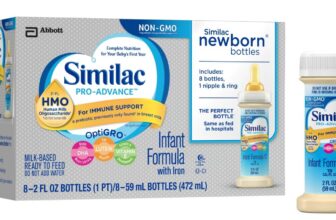
What are the Side Effects of Switching Formula? It’s not always the case that the infant formula you start with is the one you continue feeding your baby. Although all infant formula advertised and sold in the United States must fulfill the same federal nutritional guidelines, the contents vary. Food allergies to dairy or soy in infant formula are the most common causes of babies’ stomach distress, gas, and diarrhea. Cow’s milk formula may, in rare situations, raise the risk of necrotizing enterocolitis, a severe intestinal condition that affects preterm newborns. After altering your baby’s formula, the adverse effects you’re experiencing may be just allergies. We understand your curiosity about the sides effects of switching formulas has led you thus far. In this post, we’ll see every side effect of switching your infant’s formula, if any exist, and we will explain the answer of What are the Side Effects of Switching Formula?
Related: Do Babies Spit Up When Switching Formula?

Symptoms of baby not tolerating formula
What are the Side Effects of Switching Formula?
Food allergies, contaminated formula, and using a formula without sufficient nutrition are the most common causes of infant formula side effects.
Cow’s milk is used in many infant formula, and milk allergy is one of the most frequent pediatric allergies. According to the National Health Service of the United Kingdom, roughly 7% of newborns under 12 months are allergic to the protein found in cow’s milk.
The baby formula manufactured with erroneous nutrients might potentially harm your child. Because of inadequate nutrition or contamination, the CDC advises parents not to use homemade newborn formula or buy imported infant formula from third-party merchants.
All infant formula marketed lawfully in the United States adheres to the FDA’s safety and nutritional criteria. The FDA, for example, issued an infant formula recall in August 2021 due to a lack of iron in the formula. Infants with iron-deficient anemia may experience permanent cognitive and functional development impairments.
Let us know What are the Side Effects of Switching Formula?
Related: DOES ENFAMIL GENTLEASE TASTE DIFFERENT THAN ENFAMIL REGULINE
What are the Serious Side Effects of Switching My Baby Formula?
So, What are the Side Effects of Switching Formula?
Side effects from the baby formula are uncommon. Food allergies, vitamin deficiencies, and contaminated infant formula, on the other hand, can cause significant health concerns if left untreated.
When taking cow’s milk infant formula like Enfamil or Similac, premature newborns may get a severe illness called necrotizing enterocolitis (NEC). According to the Cleveland Clinic, NEC affects around one out of 1,000 preterm babies. Babies weighing less than two pounds at birth are at the greatest danger.
Food allergy life-threatening reactions, such as swelling of the tongue or throat, hives, and vomiting, are medical emergencies. These symptoms might appear days or weeks after starting a cow’s milk infant formula. Soy protein formula can potentially cause allergic reactions in babies. Seek emergency medical help as soon as possible.
Cronobacter, a bacterium, can occasionally be found in infant formula. If bottles aren’t adequately cleaned, this can happen during production, home preparation, or feeding.
Cronobacter can cause severe and sometimes deadly illnesses in babies under three months or those with weaker immune systems. Keep your hands clean and make baby formula in a clean, sterilized place.

Side effects of Similac formula milk
What Is Necrotizing Enterocolitis (NEC)?
What are the Side Effects of Switching Formula?
Necrotizing enterocolitis is a kind of gastrointestinal illness that primarily affects children.
NEC produces inflammation, resulting in the death of tissues in the gut and colon.
It can result in intestinal perforations, infection, and death.
Lack of appetite, abdominal pain or swelling, bloody feces, vomiting, and sluggishness are some of the symptoms of NEC. It usually affects newborns three to twelve days after birth, although it can happen up to a month later.
Do you know the answer of What are the Side Effects of Switching Formula?
According to research, premature newborns fed cow’s milk formula alone or as a supplement to breastfeeding have a higher risk of developing NEC.
A study published in PubMed was the first to link cow’s milk formula to NEC. Results showed NEC to be ten times more prevalent in preterm newborns given formula.
Side Effects of Changing Baby Formulas
What are the Side Effects of Switching Formula?
Your kid’s physician may advise switching baby formula on occasion. It might be due to food intolerance, formula intolerance, or other medical issues.
Switching infant formula might cause some adverse effects in some newborns, although these are mainly minor digestive difficulties like changes in feces.
Diarrhea, constipation, gassiness, or frequent vomiting up are all signs that a baby isn’t taking a specific type of formula properly.
Bloody stools, congestion, or wheezing after eating are signs of a more significant sensitivity.
If you change formulas too rapidly, it can be jarring for a baby’s fragile digestive system. Parents should gradually introduce the new formula to their infant during feeding sessions. To minimize adverse effects, be sure to ask your physician about how to transition your baby correctly and how long to try a new formula.
Can Switching Formula Hurt My Baby?
What are the Side Effects of Switching Formula?
We all know how much we love and care for our children. It’s normal to be on the lookout for the most acceptable ways to care for them, especially in the early phases of their development as lovely and delicate newborns.
As a result, it’s not unusual to hear from parents concerned about the ill effects of switching infant formula.
It’s easy to become tangled trying to determine whether or not to swap them to a different brand or kind, especially nowadays, with so many brands and types available on the market. We shall address this widespread worry.
Whatever the cause for the switch, you must monitor your kid closely during the transition from the old to the new formula.
A new substance may induce diarrhea, gas, and stomach bloating symptoms.
If the consequences are minor, don’t be concerned. It is critical to apply common sense. A newborn’s belly will not fully mature until years later, making it vulnerable to dietary changes.
It’s important to remember that adverse effects are infrequent when replacing a baby’s formula if only the brand is changed, not the kind. Most infant formulas are the same, of which not everyone is aware.
The US Food and Drug Administration (FDA) and other comparable organizations throughout the globe have strict standards in place for all infant formula on the market, requiring all producers to contain the same vital elements in all formulas.
So, whatever you feed them, you can be comfortable that they are getting the same essential nutrients.
As a result, if you’re switching between different types of formulas, such as cow milk-based (the most frequent), soy milk (the most popular substitution), hydrolyzed, or any other, you should be extra aware of any symptoms.
How Does Switching Formula Affect My Babby?
What are the Side Effects of Switching Formula?
Babies consume hundreds of bottles of formula throughout their first year of life, generally the same formula.
However, allergies or financial considerations may necessitate changing a baby’s formula.
Switching brands of the same kind of formula usually is safe, but consult your physician before making any modifications to your child’s nutritional needs.
To know What are the Side Effects of Switching Formula, you should know that:
After you’ve made the switch, pay attention to your baby’s signs to see whether an element or vitamin in the new formula triggers a reaction.
Noticeable effects may include:
1. Allergies
What are the Side Effects of Switching Formula?
Allergies may need a change in a formula, but the new formula may also trigger allergies.
Lactose-intolerant newborns, for example, are frequently converted to a soy-based formula.
Some newborns are allergic to soy, and as a result, parents may notice ongoing allergy symptoms.
As indications of an allergy, look for responses such as fussiness, diarrhea, or gas immediately after feedings.
Consult your physician for advice since it can take a while for a baby’s digestive tract to adjust to a new formula, and possibly the problem isn’t due to an allergy. The following are symptoms of a formula allergy:
- vomiting
- diarrhea
- abdominal pain
- rash
- blood in stools
2. The Taste Challenge
Your baby will likely dislike the new formula’s flavor, and a baby who doesn’t enjoy what’s in the bottle won’t want to finish his meals.
This unwillingness to eat may cause malnutrition.
Take note of how much formula your baby drinks before and after the changeover, and compare it to what he eats a week or two later.
If he’s still gaining weight and appears to be in good spirits, the new formula isn’t harming him.
3. Colic or Gas
Changing a baby’s formula is unlikely to cause (or cure) colic, although it may induce excess gas or bloat.
According to KidsHealth, gas can be caused by an allergy, but it can also be caused by switching a baby’s meals to a formula with different components or additions.
The digestive tract of a newborn is undeveloped and susceptible to any alterations.
Constipation, which is typically accompanied by gas, might result from a change in formula, particularly one reinforced with iron.
4. Spit-Up: Part of the Fun
Before burping the baby after a meal, a seasoned parent knows to cover her shoulder with a burp cloth or towel.
Spit-up can indicate a digestive problem caused by formula, but it’s also a typical reaction in some newborns after they eat.
Coughing, drooling, screaming, and the desire to burp, according to KidsHealth, can result in some post-meal spit-up, which isn’t always linked to a change in formula.
On the other hand, the spit-up might be due to a formula change if another stomach disturbance happens.
So, What are the Side Effects of Switching Formula?
Related: Can you mix similac pro advance and pro sensitive Is it ok to do
5. Bartender for Your Baby
What are the Side Effects of Switching Formula?
Because switching formula brands may be stressful for newborns, some physicians advocate blending the old and new formulas to assist your baby’s digestive system acclimatizing.
You may gradually transition your infant to the new brand by gradually reducing the amount of old formula and increasing the new formula.
Making this combination for your infant can help smooth the transition to the new formula by removing — or at the very least reducing — any potential adverse effects.
So, What are the Side Effects of Switching Formula?
Related: Similac neosure vs similac advance difference between them
Is Crying After a Formula Change Normal?
What are the Side Effects of Switching Formula?
It’s normal to blame the formula if your kid becomes fussier than usual after changing his formula.
Infant formulas can vary widely in composition, although having equal nutritional values.
Your kid may accept one brand but not another, particularly if you swap formula kinds. On grocery shelves, formulas made with cow’s milk or soybeans, hydrolyzed formulas that are easier to digest, unique formulas for low-birth-weight newborns, and lactose-free formulas all sit next to each other.
Although they appear to be interchangeable, your infant may not be able to tolerate all of them.
So, Did you know the answer of What are the Side Effects of Switching Formula?
Determining the Cause
What are the Side Effects of Switching Formula?
If you switched a formula after your baby started grumbling and screaming more frequently around 3 weeks old, it’s most likely the formula wasn’t the cause.
Colic often intensifies over the next few weeks, spiking at 6 to 8 weeks and receding by 3 to 4 months, irrespective of formula type.
Newborns who are poised to be colicky start developing it around this age.
It’s more likely that the formula is to fault if your infant is older than 4 months and has increased gastrointestinal symptoms, including spitting up, vomiting, gas, bloating, or diarrhea.
Related: Bottle washer baby brezza product review

What are the Side Effects of Switching Formula
Different Formula Types
What are the Side Effects of Switching Formula?
If you switched from cow’s milk to soy formula because your infant couldn’t handle the cow’s milk-based formula, soy formula might not be the solution.
According to the Australasian Society of Clinical Immunology and Allergy, between 20 and 50 percent of newborns who have problems with cow’s milk-based formulas also have issues with soy-based formulas.
Around 10% of newborns allergic to cow’s milk require an amino-acid-based formula.
According to PubMed Health, lactose-free formulas are seldom necessary for newborns since lactose intolerance or the inability to digest the milk sugar lactose generally does not appear until beyond the age of two or three.
Brand Differences
So, What are the Side Effects of Switching Formula?
Even if you’ve merely switched brands and not formula types, the difference might still cause digestive problems for your infant.
Make their formula “special” and offer them a selling feature to stand out from the crowd.
Manufacturers have complete control over the types and proportions of lipids, proteins, and carbs included in their formula.
Some, for example, utilize a larger ratio of whey, a more readily digestible protein, to casein, which in the stomach forms a more complex, less digestible curd.
Related: Baby brezza enfamil setting
Considerations
What are the Side Effects of Switching Formula?
The only way to discover if the formula change led to increased weeping is to return to the old formula. I
f your doctor agrees, try a different brand or formula if the previous formula was causing you difficulties.
Change formula types only after consulting your baby’s doctor, as specific formulas are unsuitable for all babies.
Formulas containing more digestible fats and more incredible calorie-per-ounce content, for example, may be needed for premature newborns.
Hypoallergenic formulas can be three times the price of cow’s milk formulas.
So, I see no reason spending more on something your kid doesn’t require.
That was the answer of “What are the Side Effects of Switching Formula?”.
Can Babies Get Diarrhea from Switching Brands of Formula?
If you’re shopping for infant formula, you might be wondering if switching brands is a good idea.
If your kid reacted well to one formula brand, changing brands might have adverse effects like diarrhea.
Switching between formulas of the same kind should not induce diarrhea, even if stool qualities vary. If your infant has a milk allergy, switching from hypoallergenic to milk-based formula might cause diarrhea.
That was the answer of What are the Side Effects of Switching Formula.
Formula Differences
What are the Side Effects of Switching Formula?
Various protein ratios and lipids may be observed in multiple brands of formula.
These variances may cause your baby’s feces to change color or become firmer or softer. Although, they do not affect your baby’s health.
Some formulas, such as hydrolyzed protein formulas for milk-allergic babies, generate more frequent bowel movements. Let your child’s pediatrician know if he suffers diarrhea.
Diarrhea is susceptible when there are more than three loose, watery stools in less than 24 hours. Diarrhea can result in dehydration.
Related: Is Similac Sensitive lactose-free
Conclusion
What are the Side Effects of Switching Formula?
In pharmacies and stores, you may find a broad variety of brands and types of formula.
Always read labels to ensure you’re getting the right formula for your kid.
Formula milk offers the nutrition that newborns require to grow and thrive.
However, it does not provide the same health advantages as breast milk to you and your baby. It cannot, for example, protect your infant against illnesses.
There is no evidence that changing formulas is beneficial or harmful.
Talk to a midwife or a health visitor if you suspect a certain kind of formula disagrees with your baby.
They may be able to assist you in deciding whether or not to try a new variety.
What are the Side Effects of Switching Formula

Outbound:







